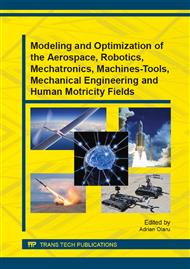[1]
A. Olaru, S. Olaru, Assisted Research of the Robots Kinematics and Dynamics Behavior with LabbVIEW Instrumentation, in: A. Olaru (Ed. ), Optimization of the Intelligent Systems and their Applications in Aerospace, Robotics, Mechanical Engineering, Manufacturing Systems, Biomechatronics and Neurorehabilitation, Trans Tech Publications Ltd, Zurich-Durnten, 2013, pp.276-285.
DOI: 10.4028/www.scientific.net/amm.332.276
Google Scholar
[2]
V. Mureşan, Management of industrial processes. Laboratory Guide, U.T. Press, Cluj-Napoca, (2011).
Google Scholar
[3]
I.V. Sita, P. Dobra, M. Dobra and V. Mureşan, Household Water Temperature Control, in: A. Olaru (Ed. ), Engineering Decisions and Scientific Research in Aerospace, Robotics, Biomechanics, Mechanical Engineering and Manufacturing, Trans Tech Publications Ltd, Zurich-Durnten, 2013, pp.417-426.
DOI: 10.4028/www.scientific.net/amm.436.417
Google Scholar
[4]
Information on http: /www. jetef. com/keyactivities. html.
Google Scholar
[5]
Information on http: /purchasing. bosch. com.
Google Scholar
[6]
V. Firescu, N. Toderici, Integrated Work Planning. Ergonomics, Communication and Modern Elements in the Management of Work, Mega Publishing, Cluj-Napoca, (2011).
Google Scholar
[7]
P. Dickmann, Schlanker Materialfluss mit Lean Production, Kanban und Innovationen, Springer Berlin Heidelberg, (2007).
DOI: 10.1007/978-3-662-44869-4
Google Scholar
[8]
Information on http: /leanromania. wordpress. com.
Google Scholar
[9]
A. Korge, H. -P. Lentes, M. Wengler, T. Hartmann, J. Röhrle, M. Kammülle, Ganzheitliche Produktionssysteme, in: H. -J. Bullinger, D. Spath, H. -J. Warnecke, E. Westkämper (Ed. ), Handbuch Unternehmensorganisation: Strategien, Planung, Umsetzung, Springer Berlin Heidelberg, (2009).
DOI: 10.1007/978-3-540-87595-6_9
Google Scholar
[10]
J. Liker, D. Meier, Toyota Talent: Erfolgsfaktor Mitarbeiter - wie man das Potenzial seiner Angestellten entdeckt und fördert, FinanzBuch, München, (2008).
Google Scholar
[11]
J. Gratch, S. Marsella, A domain-independent framework for modeling emotion, Cognitive Systems Research, 4 (2004) 269–306.
DOI: 10.1016/j.cogsys.2004.02.002
Google Scholar
[12]
R. Vlad, Logistics Systems, in: R. Vlad (coord. ), Management of Logistics Systems. Manual of Specialization, U.T. Press, Cluj-Napoca, 2010, pp.265-284.
Google Scholar
[13]
ELA Certification for Logistics Professional, information on http: /www. elalog. eu.
Google Scholar
[14]
R. Cândea, D. Cândea, Emotional competencies and management success, Editura Economică, Bucureşti, (2005).
Google Scholar
[15]
APICS Competency Model, Distribution and Logistics Managers, 2011, information on www. apics. org.
Google Scholar
[16]
C.C. Oţel, The concept of quality, Review of Management and Economical Engineering 18 (2006) 199-200.
Google Scholar


